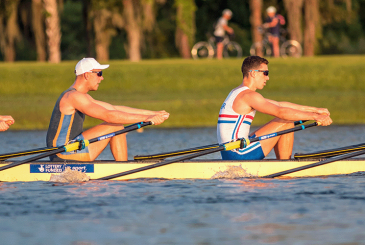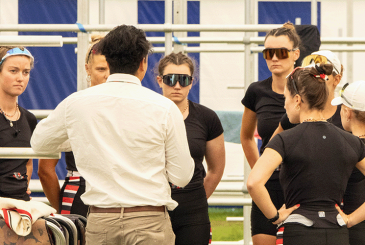Earlier this season, Hannah Vines won the 2023 British Rowing Community Coach of the Year Award. Following this, she chatted with Emma Graham about all things rowing, coaching and development.
The beginnings
Hannah began her journey into rowing at Barn Elms in London, attending after school sessions with a friend. She describes herself, like many of us would, as ‘not a sporty kid’, but this all changed following her attendance at an Eton Rowing course. After winning the course’s time trial her junior rowing successes only grew. Rowing at Henley RC, she raced in the GB versus France match, Coupe de la Jeunesse, and Junior Worlds.
Her coaching story also begins at Henley RC, where she would help out coaching various squads. ‘My dream has always been to be a rowing coach’, Vines explains, but a conversation with her school careers advisor encouraged her to become a teacher. Alongside this, though, she continued coaching on the weekends. Hannah is now the Dorney Lake Rowing Manager, coaching individuals from local schools and an adult group.
“I had known people like Penny Chuter [GB Performance Director 1986-1990] and Rosie Mayglothling [GB Rowing Team Technical Co-ordinator 2001-2015] who had been successful female coaches, so I knew it was possible.”
Life as a coach
Hannah lives for those ‘Aha!’ moments of realisation, when an athlete finally understands and everything just clicks into place. When working as part of the London Youth Rowing program, Vines remembers a 15-year old girl being moved to tears, not because she did anything wrong, but because somebody (Vines) finally believed in her. This is when she said to herself, “Right, I am in exactly the space I am meant to be.”
Having once been a participant at the Eton Rowing Courses, Vines now runs them. Often she encounters children from local Slough schools who are filled with nerves and believe they’re not good enough. These same young people later come off the water smiling and saying how amazing the session was. These are the moments that she believes keeps her motivated.
A choice-focused approach
Much of the conversation with Vines revolves around the freedom of choice both athletes and coaches have in her programme. In regard to coaching she explains, “I think you need to think carefully about the language you use with athletes at any level – what you say is what they hear.” She also discusses how all athletes also make a choice about how they behave and react to different situations, and that coaches must help young people to understand that there is always a consequence to their decisions.
With this personal independence, athletes are able to take a break from the more rigid structure of the formal education system. At Dorney, the coaching team are interested in the person, not their test results, and just want them to turn up, be safe and have fun! “I don’t really care how fast you go, as long as you are having a good time, you aren’t hurting anyone, and you are going to be a good person making good decisions,” she says.
Coaching evolution
Vines believes that when she started coaching she was a ‘tell coach’, just giving instructions on the rowing stroke. Now, she is less of an instructor, and more a true coach. Rather than measuring success on the technique of a rower, she is more focused on the amount of effort they put in on and off the water.
Coach education
After coaching for 10 years, Hannah became a coach educator, sharing her expertise on rowing and the art of coaching. In this she focuses on coaching behaviours and communication skills as well as technical knowledge.
When asked about how best to deal with the emotions of teenagers, particularly those afraid to get afloat for the first time, Hannah believes, “You cannot teach from a position of fear”. Instead, coaches should guide the young person to understand their emotions, help them work through them and reassure them that you, as their coach, will do what they can to help them. This includes checking in on them and giving them options if they feel unsafe or uncomfortable; “I need you to give me a chance as much as I give you a chance,” she often says.
Hannah advises coaches who want to develop not to be afraid to ask questions and to be open minded. Shadowing other coaches is a tool she definitely recommends as it allows you to pick up on use of language and communication skills. Hannah also uses the UK Coaching website and is exploring Open University free online courses.
With all of this embedded in Hannah’s coaching, her Coach of the Year Award is clearly richly deserved.
You can find more online coach development resources in British Rowing’s Coaching Stream.










